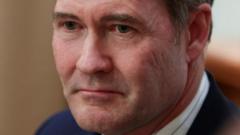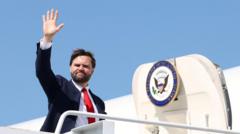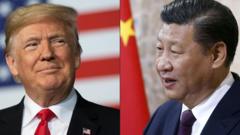In a dramatic pivot from past U.S. policy, a peace initiative proposed by the Trump administration may recognize Crimea as part of Russia. The development has elicited varied reactions, particularly among experts familiar with U.S.-Ukraine relations.
Trump's Shift on Crimea: A New U.S. Peace Proposal Raises Concerns

Trump's Shift on Crimea: A New U.S. Peace Proposal Raises Concerns
A proposed peace plan signals a significant departure from U.S. policy on Crimea, potentially acknowledging Russian control over the region.
During Donald Trump's presidency, there were fears that he could align with Russia on Crimea, following his public musings about the peninsula's preferences. Previously, the U.S. had categorically rejected Russia's 2014 annexation, with subsequent official declarations made to restore Ukrainian territorial integrity.
As diplomatic efforts between the U.S., Russia, and Ukraine evolve, Trump's recent proposal, presented in London, suggests a formal acceptance of Crimea's status under Russian control, raising concerns among former officials and experts. Daniel Fried, who has comprehensive experience in this matter, condemned this aspect of the proposal as particularly detrimental, highlighting its potential to undercut the longstanding stance held by both the prior administration and NATO allies.
The implications of this shift are profound, not only potentially altering U.S. foreign policy but also impacting diplomatic relations with Ukraine and its Western supporters. If adopted, this new stance could compel a re-evaluation of international strategies surrounding Eastern European security, reinforcing concerns about Russian expansionism in the region.
As diplomatic efforts between the U.S., Russia, and Ukraine evolve, Trump's recent proposal, presented in London, suggests a formal acceptance of Crimea's status under Russian control, raising concerns among former officials and experts. Daniel Fried, who has comprehensive experience in this matter, condemned this aspect of the proposal as particularly detrimental, highlighting its potential to undercut the longstanding stance held by both the prior administration and NATO allies.
The implications of this shift are profound, not only potentially altering U.S. foreign policy but also impacting diplomatic relations with Ukraine and its Western supporters. If adopted, this new stance could compel a re-evaluation of international strategies surrounding Eastern European security, reinforcing concerns about Russian expansionism in the region.





















